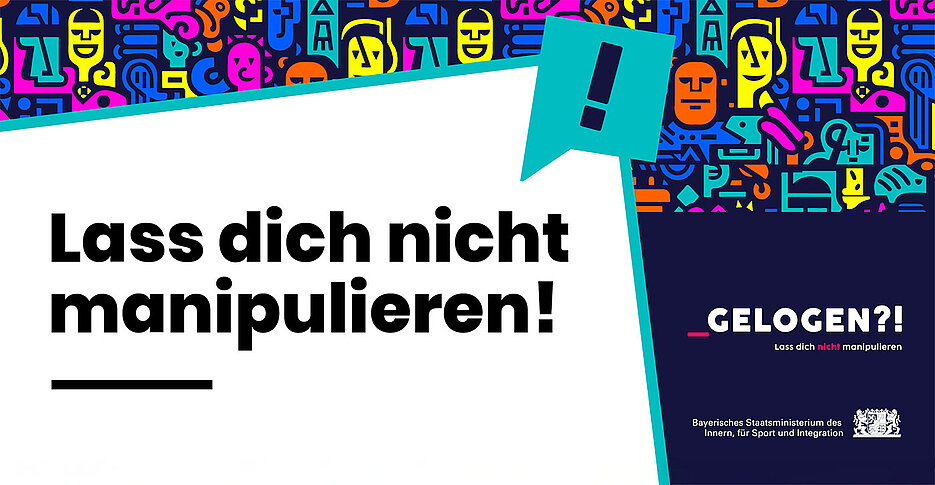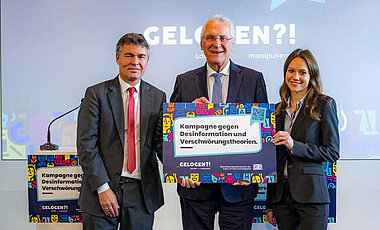New Study on Disinformation Launched on Bavarian Information Portal
11/25/2025A new information portal from the Bavarian State Ministry of the Interior helps to better understand disinformation and conspiracy theories. A study records the population's news consumption. Interested citizens can take part.

Cat videos and pictures are circulating on social media - an endless stream of fluffy distractions. On the new portal _GELOGEN?! Lass dich nicht manipulieren, such a supposed "cat feed" serves as a playful, purely hypothetical example to vividly explain typical manipulation mechanisms. In the story, unobtrusive hashtags such as #CatUniverse or #TheUnfathomableView appear, along with alleged references to alien cat espionage.
This conspiracy theory is fictitious. But it is precisely this humorous exaggeration that helps visitors to understand how disinformation can be constructed and why it is sometimes surprisingly convincing. The Infoportal has been online since 5 November 2025.
Research in a Real Information Environment
The portal is part of a large-scale study conducted by researchers from Julius-Maximilians-Universität Würzburg (JMU), Goethe University Frankfurt and the Frankfurt School of Finance & Management. Alicia von Schenk, JMU Junior Professor of Applied Microeconomics, especially Human-Machine Interaction, is in charge of the study. The study will analyse how people consume and process news and information.
"News streams are becoming ever denser, algorithmic personalisation ever more precise - as a result, misconceptions, prejudices and cognitive biases can be reinforced faster than ever before," explains Alicia von Schenk. This is precisely where the scientific approach behind the portal comes in: not just with the individual false report, but beforehand, with the psychological and behavioural mechanisms that make people susceptible to disinformation in the first place.
Fact checks or warning labels are not ineffective per se, but the evidence is inconsistent. Their impact depends on worldview, ideology, context and the way information is presented. Researchers are therefore focussing on people, i.e. investigating how people consume and process information. In order to obtain causal evidence in an authentic information context, the field study takes place on a real platform. "This allows us to observe real decisions, not just responses to hypothetical scenarios. It is important to us to empirically quantify actual behaviour and make it measurable," emphasises von Schenk.
Vivid, Interactive - and Close to Everyday Life
Visitors to the portal can expect clear explanations, from videos and examples from social media to practical tips on how to react to conspiracy narratives in their personal environment. Playful elements facilitate access: for example, interested parties can follow the trail of the supposed alien cat conspiracy, uncover an invented campaign behind the plague of snails in German gardens and recognise typical behavioural patterns.
The researchers see the project as a study of society as a whole: how can information be organised in such a way that people not only know more, but also process content in a more reflective and robust way? Participation in the study thus makes a real empirical contribution to a better understanding of the dynamics of disinformation - and which factors protect people at an early stage before misconceptions even arise. In the long term, this approach should help to strengthen digital resilience and bring about better handling of information in society.
Participation in the Study
The study will run until the end of January 2026; anyone of legal age can take part. The survey takes around 20 minutes to complete. Participants receive compensation in the form of credit for voucher codes that can be redeemed at over 100 online providers. When visiting the information portal and after accepting all cookies, a banner for participation in the study appears; occasionally two short interactive elements should be viewed.
To the information portal and the study
Contact
Prof. Dr Alicia von Schenk, Junior Professorship of Applied Microeconomics, especially Human-Machine Interaction, T. +49 931 31-86107, alicia.vonschenk@uni-wuerzburg.de
To the press release of the Bavarian Ministry of the Interior







